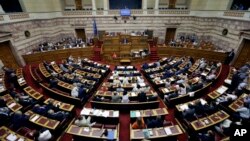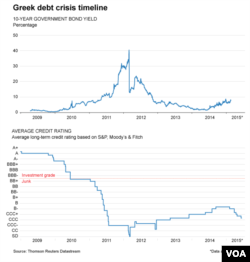The Greek government defended its new bailout program before the country’s parliament, ahead of the vote expected Friday on a bill to approve a $93 billion bailout package from the European Union.
Lawmakers wrangled over the bill in an acrimonious parliamentary committee debate that began Thursday morning.
Prime Minister Alexis Tsipras urged the parliament to approve the deal agreed on this week with international creditors — the European Central Bank, European Commission and International Monetary Fund. It imposes harsh new spending cuts and tax hikes in exchange for fresh loans.
Although Tsipras has said he expects the bill to pass, he is facing a rebellion within his governing Syriza party.
Former Energy Minister Panagiotis Lafazanis, who lost his portfolio last month after voting against another bailout-related bill, joined a group of more than 10 other left-wing politicians who announced Thursday that they would create a new anti-bailout movement.
If the Greek parliament approves the bailout package, the 19 eurozone finance ministers meeting Friday are expected to sign off on the deal.
The new funds will enable Athens to make a payment on its debt to the European Central Bank. It must repay about $3.5 billion by August 20.
Greece has been in financial turmoil for more than five years and had already received two bailouts when it came dangerously close to defaulting on its debts in June. While Athens managed to eke out a new bailout agreement with the European Union, it is forcing the government to impose new austerity measures deeply opposed by Tsipras and many Greek citizens.
Critics say Greek citizens have already endured enough financial constraint. They argue that the austerity measures will further damage Greece's ailing economy.
The government has taken several steps to try to halt the financial crisis, including closing the stock exchange for more than a month, shutting banks for three weeks and instituting limits on the amount of money Greeks could withdraw.






